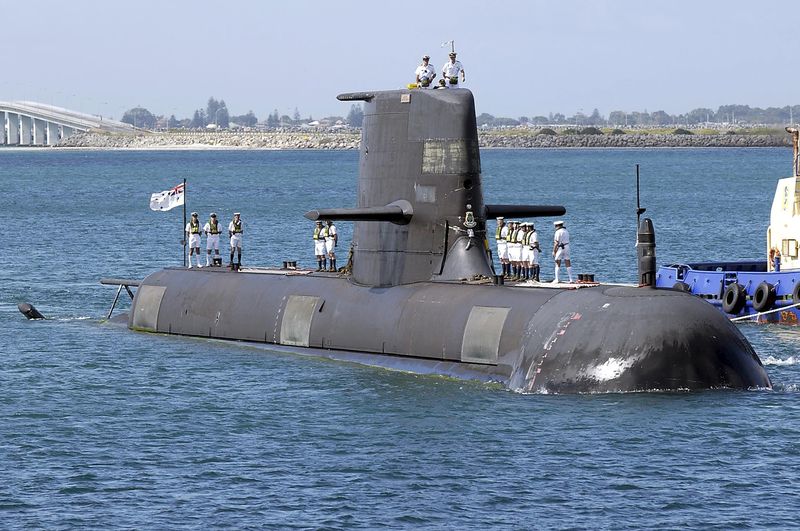By Colin Packham, Nobuhiro Kubo and Tim Kelly
SYDNEY/TOKYO (Reuters) - France has beaten Japan and Germany to win a A$50 billion ($40 billion) deal to build a fleet of 12 new submarines for Australia, one of the world's most lucrative defense contracts, Australian Prime Minister Malcolm Turnbull announced on Tuesday.
The victory for state-owned naval contractor DCNS Group marks a vote of confidence for France's defense industry and is a blow for Japanese Prime Minister Shinzo Abe's push to develop a defense export industry as part of a more muscular security agenda.
Reuters earlier reported that DCNS would be announced as the winner, citing sources with knowledge of the process.
"The recommendation of our competitive evaluation process of the panel, the department of defense, the experts who oversaw it, was unequivocal, that the French offer represented the capabilities best able to meet Australia's unique needs," Turnbull told reporters in the South Australian state capital of Adelaide where the submarines will be built.
Australia is ramping up defense spending, seeking to protect its strategic and trade interests in the Asia-Pacific as the United States and its allies grapple with China's rising power.
Japan's Mitsubishi Heavy Industries and Kawasaki Heavy Industries had been seen as early frontrunners for the contract, but their inexperience in global defense deals and an initial reluctance to build in Australia put DCNS and Germany's ThyssenKrupp AG out in front.
Both losing bidders said they were disappointed by decision but remain committed to their Australian businesses.
"Thyssenkrupp (DE:TKAG) will always be willing to further contribute to Australia’s naval capabilities," said Hans Atzpodien, Chairman of Thyssenkrupp Marine Systems.
Japan's Minister of Defense Gen Nakatani described the decision as "deeply regrettable".
"We will ask Australia to explain why they didn't pick our design," he added.
POLITICAL IMPLICATIONS
Beyond the contract price tag, Australia's decision on the submarines has political implications both at home and abroad.
Industry watchers had anticipated a decision to come later in the year, but Turnbull's gamble on a July 2 general election has sped up the process.
The contract will have an impact on thousands of jobs in the shipbuilding industry in South Australia, where retaining votes in key electorates will be critical for the government's chances of re-election.
"The submarine project .. will see Australian workers building Australian submarines with Australian steel," said Turnbull.
DCNS proposed a diesel-electric version of its 5,000-tonne Barracuda nuclear-powered submarine, enlisting heads of industry and top government figures to convince Australia of the merits of its offering.
Japan had offered to build Australia a variant of its 4,000 tonne Soryu submarine, a deal that would have cemented closer strategic and defense ties with two of Washington's key allies in the region but risked antagonizing China, Australia's top trading partner.
Under Australia's previous Prime Minister Tony Abbott, Japan was seen as leading the race to secure the submarine contract, but when he was ousted by Turnbull in a party coup, criticisms of the Japanese bid grew.
"The unfortunate takeaway is the way that the news that the Japanese bid was out of favor was leaked and this was, to the maximum extent possible, humiliating to Japan," said Euan Graham, director, international security at the Lowy Institute, a Australian think tank.
"The relationship will take a short-term hit but it will recover from it."
ThyssenKrupp was proposing to scale up its 2,000-tonne Type 214 class submarine, a technical challenge that sources had previously told Reuters weighed against the German bid.
America's Raytheon Co, which built the system for Australia's aging Collins-class submarines, is vying for a separate combat system contract with Lockheed Martin Corp (NYSE:LMT), which supplies combat systems to the U.S. Navy's submarine fleet. A decision on the weapons system is due later this year.
